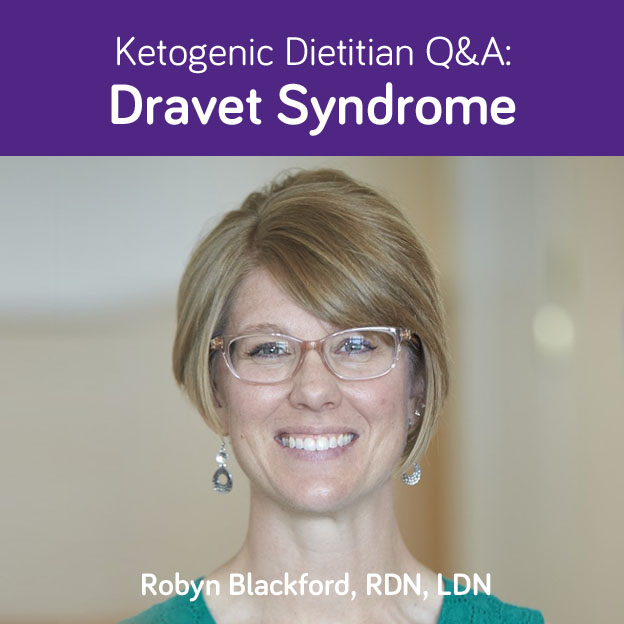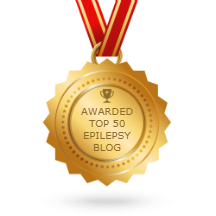
A Q&A with ketogenic dietitian Robyn Blackford, RDN, LDN. For more posts in our “Ask the Keto Dietitian” series, click here.
Can you tell us a little bit about yourself and your work as a ketogenic dietitian?
Hello! My name is Robyn Blackford and I am one of the ketogenic dietitians at Lurie Children’s Hospital in Chicago. I have been a full-time ketogenic dietitian in pediatrics for 15 years. Our center manages close to 300 patients on the medical ketogenic diet. I believe that the medical ketogenic diet has incredible possibilities and that all patients have a right to try the diet and be carefully followed by an expert medical ketogenic diet center.
I am also one of the Keto Ambassadors for Nutricia in North America, where I spend time mentoring and teaching the medical ketogenic diet to healthcare professionals.
On a more personal note, I have been married to my husband, Jason for many years and am the mom of 2 teenagers.
What is Dravet Syndrome?
Dravet Syndrome is a rare, catastrophic, lifelong form of epilepsy that begins in the first year of life with frequent and/or prolonged seizures. This epilepsy diagnosis affects 1 in every 15,700 individuals and 80% will have a mutation in the SCN1A gene.
What are the symptoms of Dravet Syndrome?
A study published in 2015 describes how patients with Dravet Syndrome typically have at least 4 of the 5 following symptoms:
- Normal or near-normal cognitive and motor development before seizure onset
- Two or more seizures with or without fever before 1 year of age
- Seizure history consisting of myoclonic, hemi-clonic, or generalized tonic-clonic seizures
- Two or more seizures lasting longer than 10 minutes
- Failure to respond to first-line antiepileptic drug therapy with continued seizures after 2 years of age
Do you have patients with Dravet Syndrome who are following a medical ketogenic diet?
Yes, our Epilepsy Center has a vast number of patients with Dravet Syndrome and many of them are on the medical ketogenic diet. Since patients with Dravet Syndrome tend to be in the intractable epilepsy category, meaning that they do not respond to first- and second-line medications, the medical ketogenic diet is often suggested as part of their next-line options. Our Epilepsy Center has been responsible for many research studies involving those with Dravet Syndrome and their families.
Is the medical ketogenic diet helpful in managing seizures for patients with Dravet Syndrome?
Yes, the medical ketogenic diet can be quite helpful in managing seizures in those with this epilepsy syndrome. Since this diagnosis can be made early in life, I like to use the diet as part of their regimen as early as possible. I have seen many times where an early diagnosis and precise management can lead to successful seizure control and positive outcomes for our patients.
Is the medical ketogenic diet helpful in managing seizures for patients with Dravet Syndrome?
Yes, there is research supporting the use of the medical ketogenic diet for patients with Dravet Syndrome. The Dravet Syndrome Foundation (DSF) website has a lot of information on past and current research studies for those with Dravet Syndrome. Included on the site is the Patient-Centered Outcomes Research (PCOR), which provides patients and their clinicians with evidence-based information in order to help them make more informed health care decisions and answer questions about the potential benefits and risks of different care options. The medical ketogenic diet is included in the PCOR.
In 2013, Dr. Linda Laux and I published a paper that found 65% of children with Dravet syndrome at our center following the medical ketogenic diet experienced a greater than 50% reduction in seizure frequency.
Do your patients with Dravet Syndrome typically remain on their antiepileptic drugs (AEDs) while they are following the medical ketogenic diet?
Yes, many patients with Dravet Syndrome remain on some AEDs. But, the wonderful team of professionals with whom I work always aim for the least amount of seizures with the least amount of side effects possible. So, they are always looking for ways to decrease medications without losing the seizure control that they have. They look to balance quality of life with the seizures. I feel like the medical ketogenic diet is a great addition to a seizure management plan, especially when it’s taking the place of a sedating medication that is not helpful to a patient’s quality of life.
Is there a specific type of medical ketogenic diet that is recommended for patients with Dravet Syndrome (for example, classical ketogenic diet, modified Atkins diet, etc)?
No, there is not one specific type of medical ketogenic diet that is recommended. Any of these versions of the diet can be helpful for seizure control. The preference for diet options may depend, for example, on the age and feeding differences between patients. So, please discuss these issues with your child’s neurology and/or keto provider.
How long do patients with Dravet Syndrome typically stay on the medical ketogenic diet?
Patients can be on the diet for as long as they need to be to help manage seizures. The keto team will require intermittent visits for follow up and blood work to assess the safety of the patient for the duration of the diet. Often times patients are on the diet for a few years before attempting a wean of the diet or simply going to a less restrictive version of the diet (such as the modified Atkins diet) for maintenance. If the medical ketogenic diet fails to be beneficial, then it would be stopped more quickly according to the plan from your keto team.
Where can families of Dravet patients find more information about the medical ketogenic diet?
Here are some of my favorite websites to visit for more information:
References:
Laux L, Blackford R. The ketogenic diet in Dravet syndrome. J Child Neurol. 2013;28(8):1041-1044. doi:10.1177/0883073813487599.
Wu, E., et. al. (2015). Incidence of Dravet Syndrome in a US Population. Pediatrics 136(5): 1310-e1315. doi: 10.1542/peds.2015-1807.


 Follow
Follow